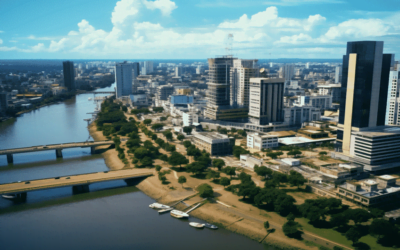You know that feeling when you’re all set to launch your drone, and you suddenly wonder, “What are the drone laws in Thailand?” I’ve been there. It’s a common thought that many of us drone enthusiasts have, especially when we’re exploring new horizons with our flying companions.
The thrill of flying a drone is incredible, but understanding the regulations is crucial for a smooth and trouble-free experience.
I decided to delve deep into Thailand’s drone laws to bring you the answers you’ve been searching for. Trust me, it’s not just about regulations and rules; it’s about knowing how to fly responsibly while enjoying the stunning landscapes and experiences Thailand has to offer.
My extensive research has uncovered the ins and outs of Thailand’s drone laws, so you can take to the skies with confidence.
So, if you’re eager to unlock the secrets of flying drones in Thailand, you’re in the right place. In the following article, we’ll walk through the regulations, registration, and different requirements for hobbyists, commercial operators, tourists, and government drone enthusiasts.
Whether you’re a seasoned pilot or just getting started, this article is your comprehensive guide to understanding and navigating Thailand’s drone laws. Keep reading to ensure you’re in the know and ready for your next drone adventure.
- Navigating the Permits and Regulations
- Rules During Drone Flights in Thailand
- Agencies Responsible for Drone Regulations
- Drone Registration and Licensing
- Specific Rules for Recreational and Commercial Drone Operators
- Drone Regulations for Visitors to Thailand
- Government Drone Operators in Thailand
- Notes for Foreign Operators
- Final Thoughts on Thailand Drone Laws
- Frequently Asked Questions on Thailand Drone Laws
Navigating the Permits and Regulations

Alright, let’s get into the nitty-gritty of Thailand’s drone laws, a crucial topic for anyone looking to take flight in the Land of Smiles. Now, if you’ve been thinking about dusting off your drone and capturing those breathtaking Thai landscapes, you’ll want to know all about the two permits that’ll let you spread your drone’s wings.
I’ll walk you through the details of UAV’s Radio Equipment Registration and Remotely Piloted Aircraft (RPA) Registration. Ready to soar with me?
UAV’s Radio Equipment Registration (NBTC)
First, let’s talk about UAV’s Radio Equipment Registration, a key requirement overseen by the Office of The Thailand National Broadcasting and Telecommunications Commission (NBTC). Think of this as your drone’s ID card in Thailand. You see when you’re flying a drone equipped with any sort of camera, this permit becomes your sidekick.
It’s not just about capturing stunning footage; it’s also about keeping things legitimate. So, if your drone has a camera on board, make sure to get this permit.
Now, you might wonder why all this fuss about permits? It’s simple, really. Safety and accountability are paramount. Thailand wants to make sure drone operators fly responsibly, without causing harm or disturbance to others.
So, remember that when you’re cruising the skies in this beautiful country, you’re not just another pilot; you’re part of a community working together to ensure everyone’s enjoyment and well-being.
Importance of Compliance
Let’s talk about why it’s essential to follow these regulations. Imagine being in a place as stunning as Thailand, with its lush jungles, pristine beaches, and vibrant cities. You’re taking your drone for a spin, capturing all these incredible moments.
But, along with the thrill comes responsibility. Those permits we talked about? They’re more than just paperwork; they’re a commitment to safe and respectful drone flying.
Following the rules helps ensure a harmonious coexistence with locals, fellow travelers, and the environment. It’s not about curbing your enthusiasm; it’s about enhancing it. With the right permits and adherence to the regulations, you can fly with the confidence that you’re making a positive impact.
Plus, it’s all about preserving the freedom to keep exploring the endless possibilities that drone flying offers. So, let’s keep those permits handy and those regulations in mind as we continue our journey through Thailand’s drone laws.
Also Read: Drone Laws in Tanzania 2024
Rules During Drone Flights in Thailand

As we continue our journey through Thailand’s drone laws, it’s crucial to understand the rules and restrictions that apply when you’re soaring above this beautiful land.
Whether you’re an experienced drone pilot or just getting started, knowing these guidelines is essential. So, let’s dive into the specifics of drone flight rules and the responsibilities that come with it.
Rules and Restrictions
Now, when you’re up there in the Thai skies, there are specific rules and restrictions to keep in mind. You see, these rules are not just about compliance; they’re about ensuring safety and harmony.
You should avoid flying in a way that could harm people, property, or peace. That means being mindful of your surroundings and making sure your drone isn’t causing any disturbances.
Also, steer clear of restricted, limited, and dangerous areas that are published in the Aeronautical Information Publication – Thailand. It’s common sense, right? You wouldn’t want to fly near government buildings, hospitals, or places that can be sensitive without the necessary permissions.
Oh, and always ensure your take-off and landing areas are obstruction-free. These rules are about keeping everyone safe while you enjoy your drone flights in Thailand
Responsibility in Case of Accidents
Now, let’s talk about something equally important—what to do in case of accidents. Accidents can happen to the best of us, even when we’re flying responsibly. The key is to act swiftly and responsibly.
If there’s an accident or something goes wrong during your drone flight, it’s your responsibility to contact the relevant authorities immediately.
This isn’t just a formality; it’s about ensuring that proper actions are taken to address any situation. It’s like being a good neighbor, looking out for one another. By reaching out to the authorities when needed, you’re not only fulfilling a legal requirement but also being a responsible drone pilot.
So, when you’re out there capturing incredible moments from the sky, remember these rules and your responsibilities—they’re the wings that’ll keep your drone flights soaring smoothly in Thailand.
Also Read: Drone Laws in Tajikistan 2024
Agencies Responsible for Drone Regulations

Now, let’s get acquainted with the key player in Thailand’s drone regulations—the Civil Aviation Authority of Thailand (CAAT). They’re the folks responsible for keeping the skies safe and ensuring that we drone enthusiasts can pursue our passion responsibly.
Civil Aviation Authority of Thailand (CAAT)
The Civil Aviation Authority of Thailand (CAAT) is like the guardian of the Thai skies. Think of them as the referees ensuring that everyone plays by the rules when it comes to drones. They’re the go-to authority for everything drone-related in Thailand.
From issuing permits to setting regulations, they’ve got the final say in how we operate our drones.
Now, while dealing with regulatory bodies might sound daunting, CAAT is here to make things smoother for all of us. Their role is to maintain safety, enforce regulations, and ensure that drone flights coexist harmoniously with other activities in Thai airspace.
They’re like the air traffic controllers for drones, ensuring that we all get our slice of the aerial pie without any hiccups. So, when you’re flying your drone in Thailand, remember, that CAAT is here to make sure everything runs like clockwork.
Also Read: Drone Laws in Taiwan 2024
Drone Registration and Licensing

Okay, here we go. If you’re planning to take your drone out for a spin in Thailand, it’s essential to get the paperwork sorted out. So, let’s delve into the significance of registering your drone and obtaining the necessary licenses. Think of it as your drone’s passport to exploring the skies.
Registration Based on Camera Equipment and Weight
Now, you might be wondering, “Do I really need to register my drone?” Well, the answer depends on two critical factors: the camera equipment your drone carries and its weight.
If your drone is packing any kind of camera, whether it’s for capturing breathtaking landscapes or recording memorable moments, you’ll need to get it registered. This is where Thailand’s drone regulations aim to keep everything above board.
Weight also plays a role here. Drones weighing more than 2 kilograms are on the radar for registration. But, here’s the good news: if your drone is camera-free and falls below that 2-kilogram mark, you’re in the clear.
The registration process may sound a bit bureaucratic, but it’s all about ensuring responsible and safe drone operation.
Special Registration Requirements for Heavier Drones
Now, what if you’re flying a big boy, a drone that exceeds 25 kilograms? That’s where things get a bit more complex. In this case, you won’t just be dealing with the Civil Aviation Authority of Thailand (CAAT); you’ll need the green light from the Ministry of Transport.
It’s like going through a different checkpoint at the airport. The additional weight and potential risk require a special sign-off to ensure safety. It’s all part of keeping the skies secure for everyone.
Registration Process and Drone Pilot’s License
So, how do you get these permits? The registration process involves a dance between two main agencies: the Civil Aviation Authority of Thailand (CAAT) and the National Broadcasting and Telecommunications Commission (NBTC).
CAAT is your go-to for drone registration, while NBTC handles the registration of the frequency used by drones. These permits are like the keys to your drone’s journey in Thailand.
But, it’s not just your drone that needs the paperwork; you do too. To ensure proper drone operation, you need something equivalent to a pilot’s license. This isn’t about attending flight school; it’s more about demonstrating that you know the ropes.
It’s like getting your driver’s license—it proves you’re skilled and responsible. So, when you’re out there soaring through the Thai skies, remember, that these registrations and licenses are your partners in crime, ensuring you have a safe and memorable drone adventure.
Also Read: Drone Laws in Syria 2024
Specific Rules for Recreational and Commercial Drone Operators

Alright, let’s talk shop about the specific rules for drone operators in Thailand. Whether you’re a hobbyist looking to capture those stunning sunsets or a commercial operator with big plans, there are some key regulations you’ll want to be aware of.
So, let’s explore the rules and requirements for both categories and find out what it takes to be a responsible and legal drone operator in Thailand.
Rules and Requirements for Hobbyists and Commercial Operators
First things first, no matter your intentions—recreational or commercial—you’ll need to follow the same basic rules and requirements. These are the building blocks of responsible drone operation.
Now, I know the word “regulations” might sound intimidating, but they’re here to ensure that drone flights are enjoyable, safe, and respectful for everyone.
Pilot License, Registration, and Insurance
Now, let’s dive a bit deeper into the essentials for both hobbyists and commercial operators. You’ll need a Thailand drone pilot license, which is like your badge that says, “I know what I’m doing up here.”
It’s a way of showing that you’re skilled and responsible, and it’s equally crucial for both categories.
Next up, there’s registration. Your drone, regardless of its purpose, must be registered. It’s a way of ensuring accountability and safety in the skies. And last but not least, insurance. While it’s not a mandatory requirement, it’s highly recommended. Think of it as a safety net in case of unforeseen mishaps.
Plus, it’s always good to have peace of mind while you’re up there, capturing stunning footage or conducting commercial operations.
So, whether you’re a drone hobbyist chasing beautiful landscapes or a commercial operator with exciting projects, these rules and requirements are your compass to ensure your drone adventures in Thailand are both thrilling and responsible.
Also Read: Drone Laws in Switzerland 2024
Drone Regulations for Visitors to Thailand

Thailand is a fantastic destination for tourists and travelers from around the world. But what if you’re not a local and you want to fly your drone here? Well, I’ve got some good news for you. There are guidelines in place for foreign visitors to ensure you can enjoy drone flying while exploring this beautiful country. So, let’s dig into what you need to know to fly your drone as a visitor in Thailand.
Guidelines for Foreign Visitors and Tourists
If you’re a foreign visitor or a tourist, you’re in luck because you can still operate your drone in Thailand. However, there are some guidelines to follow to ensure you’re flying within the law. Safety and respect for local regulations are paramount, so make sure you’re aware of the rules specific to drone operation while you’re here.
Registration Process and Drone Insurance
Now, let’s talk about the nitty-gritty—how to get started with your drone adventure as a visitor. The registration process in Thailand is relatively straightforward, and it’s essential to keep everything above board.
While it’s not mandatory, I highly recommend getting drone insurance. It’s like that extra layer of protection that can give you peace of mind during your flights.
So, if you’re a traveler with a drone, you’re all set to capture the beauty of Thailand from the skies. Just remember to follow the guidelines and consider getting that drone insurance for a worry-free and memorable drone adventure in the Land of Smiles.
Also Read: Drone Laws in South Sudan 2024
Government Drone Operators in Thailand

Now, let’s talk about a slightly different category of drone operators in Thailand—the government. You see, government agencies also take to the skies with drones for various purposes, and they have their own set of rules and regulations to follow. So, let’s explore what it takes to operate a drone as a government entity in the Land of Smiles.
Rules and Regulations for Government Drone Operations
Government drone operations come with their own playbook. While the rules are somewhat similar to other categories of operators, government agencies have their unique set of guidelines. These guidelines ensure that government drone operations are conducted safely, responsibly, and in accordance with Thailand’s laws.
Government Drone Pilot License, Registration, and Lack of Insurance Requirements
Just like the rest of us, government drone operators need to obtain a pilot license for their operations. However, they have specific channels and regulations to follow due to the nature of their work.
Interestingly, while registration is still a requirement, government drone operations are not required to carry drone insurance. This makes sense when you consider that the government has its processes for handling unforeseen situations.
So, if you ever spot a government drone buzzing around the skies of Thailand, you can rest assured that they’re following the necessary regulations and guidelines to ensure safety and responsibility in their operations. It’s all part of keeping the Thai airspace secure and functional for everyone.
Also Read: Drone Laws in South Africa 2024
Notes for Foreign Operators

For all you fellow drone enthusiasts hailing from foreign lands, Thailand welcomes you with open skies and some straightforward rules to make your drone adventure memorable. Whether you’re a seasoned pilot or a newcomer to the drone world, there are specific considerations to keep in mind. So, let’s delve into what you need to know as a foreign drone operator in the Land of Smiles.
Special Considerations for Foreign Drone Operators
As a foreign drone operator, you’re in for a treat as you explore the breathtaking landscapes of Thailand from above. However, there are some special considerations to take into account. Registration and documentation are key here.
You’ll need to ensure that your drone is properly registered and that your documentation is in order. It’s like having your passport and visa when you’re visiting a new country. These steps are all about ensuring your drone flights are safe, legal, and enjoyable.
Registering with NBTC and CAAT
Now, let’s get into the nitty-gritty of registration. You’ll need to go through a two-step process involving the National Broadcasting and Telecommunications Commission (NBTC) and the Civil Aviation Authority of Thailand (CAAT).
NBTC handles the registration of the frequency used by your drone, while CAAT manages the registration of the persons who control and are in charge of the drone. It might sound like a handful, but these steps are designed to ensure smooth and safe operations.
Validity Period of Registrations
You might be wondering, “How long are these registrations valid?” Well, good news! Once you’ve successfully registered, the registration is typically valid for two years.
That means you can enjoy your drone adventures in Thailand for an extended period without worrying about renewing your paperwork frequently. It’s like getting a multi-entry visa for your drone.
So, fellow drone enthusiasts from abroad, when you’re flying your drone in Thailand, rest assured that these simple guidelines and considerations are here to make your experience enjoyable and hassle-free. Happy flying!
Also Read: Drone Laws in Slovakia 2024
Final Thoughts on Thailand Drone Laws

So, there you have it—the comprehensive guide to navigating Thailand’s drone laws. We’ve covered everything from permits and registration to specific rules for different operators and even some tips for our foreign drone-flying friends.
Now, as we wrap things up, let’s sum it all up and reiterate the significance of adhering to these laws for safe and legal drone operations.
First and foremost, it’s crucial to remember that Thailand’s drone regulations are in place to ensure safety and responsibility. If you’re flying a drone with a camera or one weighing over 2 kilograms, registration is a must.
For heavier drones exceeding 25 kilograms, special permissions are necessary. These regulations are about keeping the skies secure and respectful for everyone.
Compliance with these regulations is more than just a formality; it’s about being a responsible drone operator. Whether you’re a hobbyist capturing stunning scenery or a commercial operator with big plans, following the rules ensures a positive and secure drone experience.
It’s like observing traffic rules when you’re driving—it’s for the safety and well-being of all involved.
Finally, the world of drone regulations is constantly evolving. New rules and guidelines may come into play, so it’s essential to stay updated. If you have specific questions or inquiries, don’t hesitate to contact the relevant authorities.
They’re there to help and ensure a smooth journey for your drone adventures in Thailand.
So, as you prepare to take your drone to the Thai skies, remember that these regulations are here to make your experience enjoyable, safe, and respectful. Happy flying, and may your drone capture the beauty of Thailand in all its glory!
Frequently Asked Questions on Thailand Drone Laws
Can I fly a drone in Thailand as a foreign visitor or tourist?
Absolutely! Thailand welcomes foreign drone operators, whether you’re a visitor or a tourist. However, there are guidelines to follow, including registration and proper documentation. It’s important to ensure that your drone is registered and that you have all the required paperwork. This way, you can enjoy the breathtaking landscapes of Thailand from above while flying legally and responsibly.
Do I need a drone license to operate in Thailand?
For both hobbyist and commercial drone operators, having a drone license is essential. It’s like your badge that says, “I know what I’m doing up here.” The license is a way to demonstrate your skills and responsibility in the drone world. Regardless of your intentions, whether you’re capturing scenic views or conducting commercial operations, a drone license is a must in Thailand.
What are the registration requirements for drones in Thailand?
All drones, whether used for recreational or commercial purposes, must be properly registered in Thailand. The registration process involves two agencies: the National Broadcasting and Telecommunications Commission (NBTC) for the frequency used by your drone and the Civil Aviation Authority of Thailand (CAAT) for the persons who control and are in charge of the drone. It’s a straightforward process to ensure accountability and safety.
Is drone insurance required in Thailand?
While drone insurance is not mandatory in Thailand, it’s highly recommended. Think of it as a safety net for unforeseen mishaps during your flights. Whether you’re a hobbyist or a commercial operator, having drone insurance can provide peace of mind and financial protection in case of accidents.
What are the key regulations for operating a drone in Thailand?
The key regulations for operating a drone in Thailand include obtaining the necessary permits, registering your drone, following specific flight rules, and keeping safety as a top priority. Drones equipped with cameras or weighing over 2 kilograms must be registered. Flight rules include keeping the drone within a visual line of sight, not flying near people or buildings, and avoiding restricted areas. These regulations ensure the safety and security of the skies in Thailand.













